It’s almost the time of year so many of us look forward to for months. But, while we are busy decking the halls and cooking elaborate feasts, our pets may have a different agenda. Not only can the holidays pose certain dangers to our furry friends, but some circumstances are downright stressful. Consider some important safety concerns for each of the holiday celebrations.
Thanksgiving
Imagine the delightful, savory smells of Thanksgiving dinner, and the scrumptious desserts that follow. Factor in a table full of your favorite people, and you have a traditional feast that’s hard to beat. More than likely, your pets don’t steer far from the kitchen while you prep for this food-centered day, but when guests arrive, pets may seek peace and quiet. Keep in mind the following:
- Dangerous foods — It is no secret that many foods we commonly consume can be toxic to dogs and cats. Refrain from giving your pet any of the following popular Thanksgiving foods:
- Turkey skin and gravy — While a small taste of lean turkey meat is likely harmless to your pet, high-fat skin and prepared gravies can lead to vomiting, diarrhea, or pancreatitis.
- Meat bones — Soft, cooked bones are especially dangerous to pets, who may ingest whole or fragmented pieces, leading to a variety of problems, including gastrointestinal obstruction that often requires surgery.
- Garlic and onions — These frequently used ingredients can cause red blood cell damage and anemia in small animals. Cats are more susceptible, but dogs are not immune to their toxicity.
- Yeast dough — If making bread is on the Thanksgiving agenda, ensure that dough is kept out of nose’s reach. When ingested, the yeast activates and rises in the warm, acidic stomach and can cause painful stomach torsion and bloat, a life-threatening emergency.
- Give pets a safe haven — While some pets enthusiastically greet visitors at the door and enjoy a big party, others prefer a quiet evening without guests. Still others become positively stressed when strangers enter the home. Do yourself and your pets a favor and provide a safe, quiet retreat away from the celebration. Play some calming music or soft television in the background, provide a few favorite toys, and leave some food or a long-lasting treat. Provide an exit for your pet in case he wants to socialize, but never force any interaction.
Christmas and Hanukkah
After Thanksgiving, it’s time to break out the holiday decorations. From string lights, to candles, to festive trees, nothing brings more good cheer than decking the halls. But, before dragging out the boxes of tinsel and ornaments, think about your pets. Consider the potential dangers associated with these common decorations:
- Christmas trees — Whether you choose a real spruce or the artificial variety, trees in the home can be dangerous. Cats love to climb these trees, which can easily topple over if not properly tethered to an adjacent wall or ceiling. Pets must never be allowed to drink the tree water, and you should never add supplements or medications.
- Ornaments — Refrain from placing ornaments on lower parts of the tree and choose non-glass varieties, if possible. String lights, while festive, pose electrocution risks to pets who chew them.
- Menorahs — Traditional menorahs and other candles pose serious fire hazards to any home. Add a curious kitten or rambunctious Labrador to the mix, and you have a recipe for potential disaster. Opt for battery-operated versions, but if you cannot forego lit candles, ensure that menorahs and other structures are placed on stable surfaces away from pets and drapery. Never leave lit candles unattended near pets.
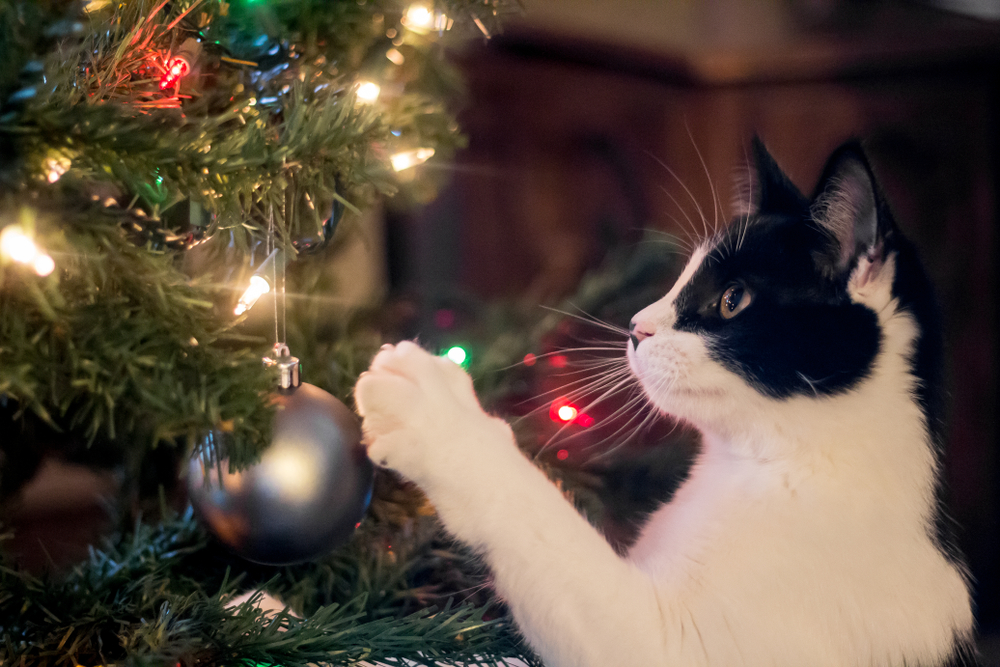
New Year’s Eve
Thanksgiving leftovers are all gobbled up and the holiday decorations are back in their boxes. That means it’s time for one last hurrah before year’s end. If you’re planning a New Year’s Eve fete in your home, don’t forget to keep in mind the following:
- Alcohol — Alcohol is potentially toxic to pets, as well as people. Since many alcoholic drinks are sweetened, they become all the more alluring to pets. Signs of alcohol intoxication in pets include vomiting, diarrhea, incoordination, tremors, difficulty breathing, and depression. Never offer an alcoholic drink to a pet, and never leave drinks unattended.
- Loud noises — All of the loud music, laughing, and chanting that often accompanies a New Year’s party can be too stressful for pets. If possible, find an alternative space for your pet to relax on this chaotic night, or consider boarding him for the evening. If he must stay for the party, secure him with a properly fitted collar and up-to-date identification tag. Many pets attempt to flee when they are scared, especially in loud environments. Microchips, which can be inserted under your pet’s skin during a quick and simple veterinary appointment, are a reliable way to ensure your pet returns home if he becomes lost.
Our veterinary team wishes our clients and patients a cheerful and safe holiday season. Do not hesitate to contact us with any questions about holiday safety and pets, or to set up an appointment for microchipping.


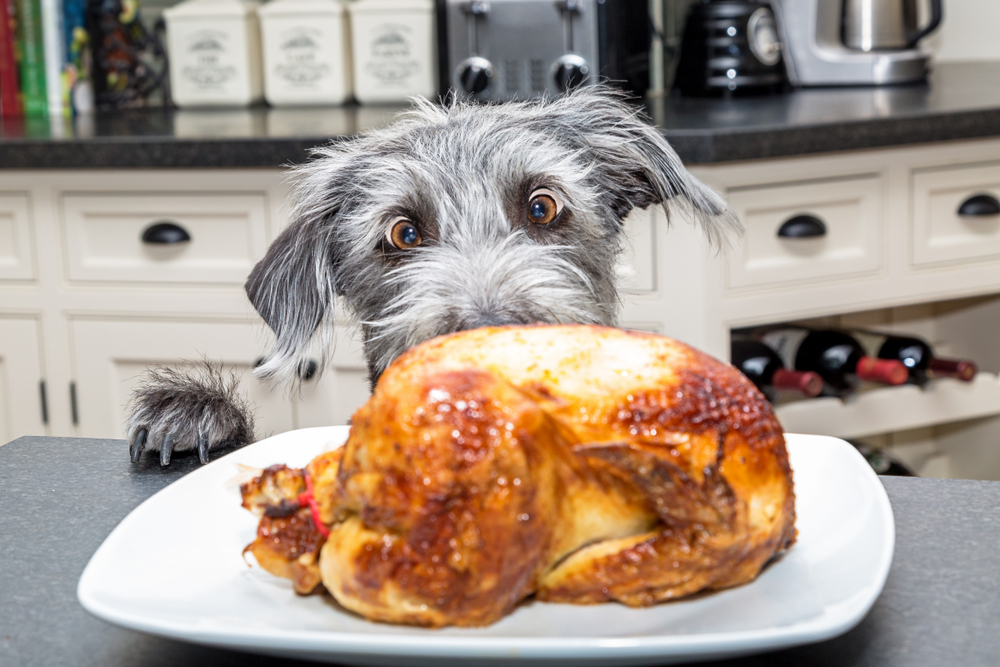
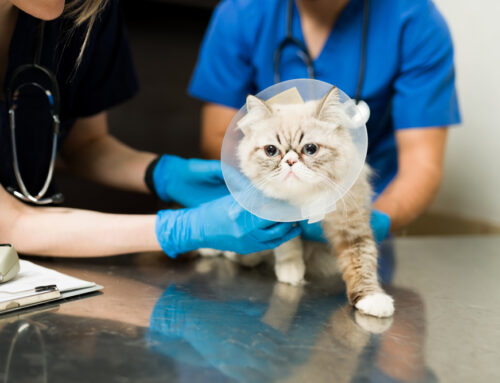
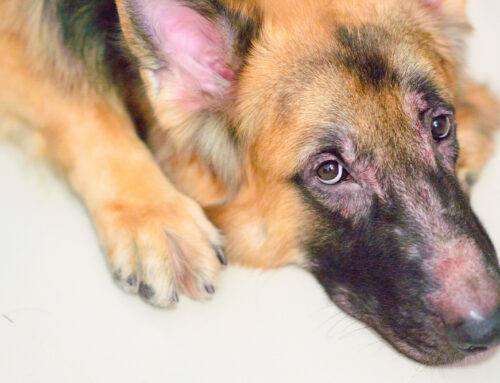
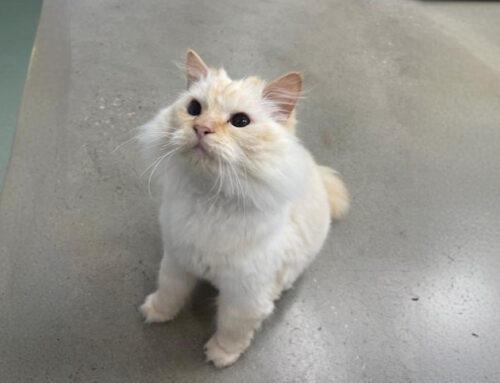
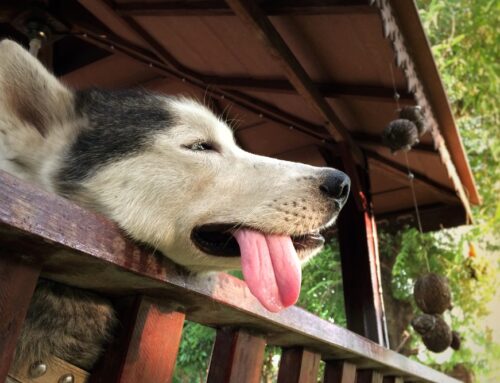
Leave A Comment